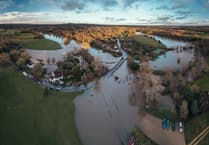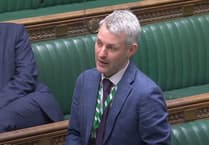CHOBHAM sewage works has been exposed as the worst Thames Water treatment site in the area for spilling effluent into streams and rivers.
The storm overflow at the works in Broadford Lane discharged into the nearby River Bourne 98 times in 2021, for a total of 1,140 hours.
The figures were discovered by environmental campaigner Andrew McManus. “On average, this is about twice a week for 24 hours per week,” he said.
“This appalling state is caused by a combination of under-investment by Thames Water, poor regulation by the Environment Agency and national government inaction since the privatisation of the water companies.”
Mr McManus compared the Chobham discharges with much-less frequent overflows at Thames Water works at Lightwater and Chertsey.
Last year, the sewage works in Blackstroud Lane East, Lightwater, spilled 23 times for a total of 82 hours into the Hale Bourne, which becomes the Mill Bourne when it reaches Chobham village.
The storm overflow in Lyne Lane, Chertsey spilled 48 times into the Chertsey Bourne for a total of 654 hours.
Mr McManus said the spillages into the rivers were the result of heavy rainfall overwhelming the storage tanks at treatment works, which collect both rainwater and sewage.
“Solids are filtered out before the effluent gets into the streams but it stills contains viruses, bacteria and organic nitrates,” he said.
“The effects are that invasive plant life is encouraged to grow and the muddy water blocks out the sunlight that plants on the riverbed need. Deposits in the wastewater cover the riverbed in silt, so that fish find it hard to find places to lay their eggs.”
Mr McManus drew the public’s attention to the sewage-spill problem with a protest in the River Bourne where it flows through the Heather Farm nature reserve in Horsell, about a mile from the Chobham sewage works.
He was joined by Horsell borough councillor John Morley, who said: “We’re so fortunate to have beautiful countryside on our doorstep and we need to do all we can to protect it. We’re also fortunate to have people in Horsell like Andy who are working tirelessly to highlight the problems of sewage in our waterways.”
Cllr Morley aims to persuade Woking Borough Council’s overview and scrutiny committee to summon Thames Water to account for the unacceptable discharges.
“The council has no direct responsibility but it can write an open letter to Thames Water, the Environment Agency, Ofwat, and the Environment Secretary expressing growing concerns and its lack of confidence in the Chobham works,” said Mr McManus.
He suggested that spills at Chobham should be restricted to 12 times a year, with just two allowed during the summer.
Thames Water should also be planning improvements to the Chobham works that will be effective for 50 years.
“The Environment Act 2021 was passed last November with targets for improvements in sewage treatment, but the problem has been kicked down the road for 20 or 30 years. I have some sympathy for the private water companies, but they should have been planning improvements 20 years ago.”
A spokeswoman for Thames Water confirmed the figures for overflow spills from the Chobham works.
“Thames Water’s shareholders have recently approved an additional £2billion of investment into the business as part of a turnaround plan to improve performance and outcomes for customers, leakage and river health,” she added.
“Although we regard any discharge of untreated sewage as unacceptable, and are working hard to make them unnecessary, this will take time.”


.jpeg?width=209&height=140&crop=209:145,smart&quality=75)

